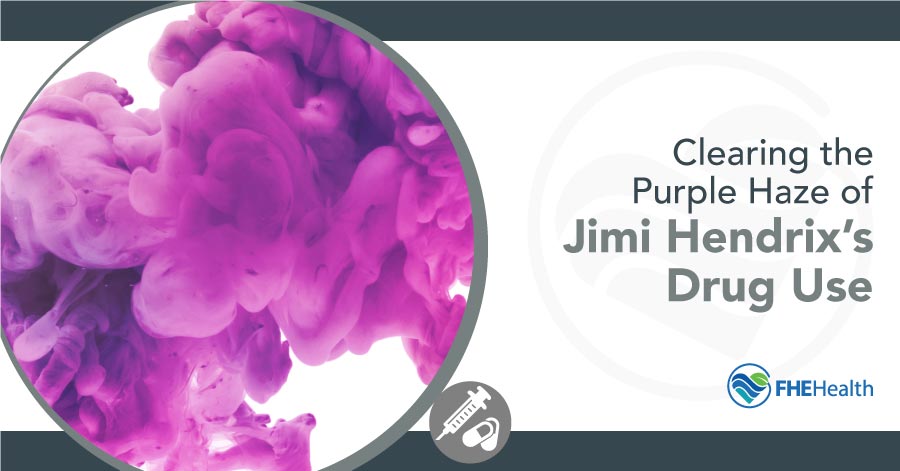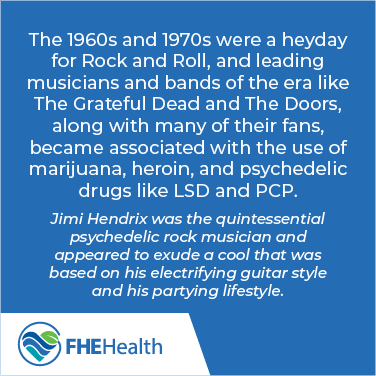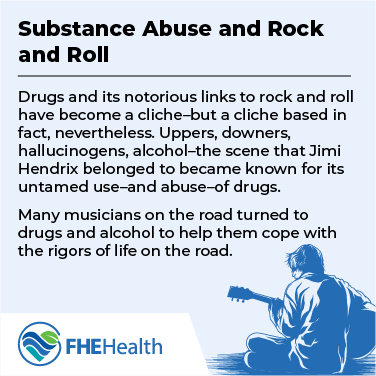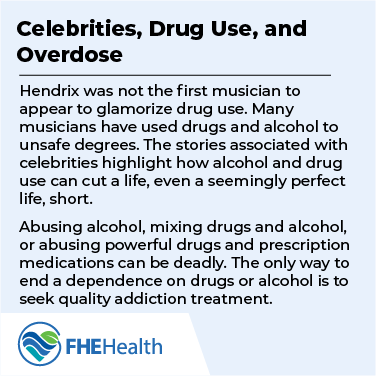
It’s no secret that the dawn of the rock and roll scene was soon accompanied by a period of rampant drug use. Although drugs like cocaine were actually featured in many everyday products like Coca-Cola in the 19th century, the widespread abuse of drugs didn’t occur until after World War II, especially during the years surrounding the Vietnam War. The 1960s and 1970s were a heyday for Rock and Roll, and leading musicians and bands of the era like The Grateful Dead and The Doors, along with many of their fans, became associated with the use of marijuana, heroin, and psychedelic drugs like LSD and PCP.
In many ways, guitar virtuoso Jimi Hendrix became the quintessential psychedelic rock musician. For a time, Hendrix appeared to exude a cool that was based on both his electrifying guitar style and his partying lifestyle. At a time when drugs were virtually given away at concert venues and shared among free-spirited concert goers, few people understood the inherent dangers associated with the chemicals they were using to get high. Hendrix himself, like many other rock and roll legends, became a casualty of that mid-century drug scene.
Jimi Hendrix and His Electrifying Career
 Born in 1942, James Marshall Hendrix, a.k.a Jimi Hendrix, was born in Seattle Washington. He began playing guitar at the age of 15. After a short stint in the army in 1961, Hendrix moved to Tennessee where he began to play professionally. He soon earned a spot with the Isley Brothers and then Little Richard. During the early 1960s, he also played with performers such as Wilson Pickett, Ike and Tina Turner, and Sam Cooke.
Born in 1942, James Marshall Hendrix, a.k.a Jimi Hendrix, was born in Seattle Washington. He began playing guitar at the age of 15. After a short stint in the army in 1961, Hendrix moved to Tennessee where he began to play professionally. He soon earned a spot with the Isley Brothers and then Little Richard. During the early 1960s, he also played with performers such as Wilson Pickett, Ike and Tina Turner, and Sam Cooke.
While playing with other influential acts, Hendrix also wrote music and launched his own band, The Jimi Hendrix Experience by 1966. According to reports, Hendrix had begun to feel stifled by performing backup for strictly R&B acts. With the ‘Experience,’ he was able to take his music in a truly singular direction, creating songs with mesmerizing guitar solos that took the music world quite by storm–electrical storm.
Upon taking his act to London where he was noticed by prominent rock and roll artists of the day like John Lennon, Mick Jones, and Brian Jones, Hendrix achieved major notoriety. His days of playing backup became a thing of the past as his most celebrated songs “Purple Haze,” “Hey Joe,” and “All Along the Watchtower” (a Bob Dylan cover) soared up the music charts. His double album hit number one on the album charts and he led the performer list at Woodstock in 1969. Unfortunately, an accidental overdose cost Hendrix his life the following year, cutting his brief but astonishing music career short.
Hendrix and Substance Abuse
Hendrix certainly wasn’t alone in his use of drugs. However, though he admittedly used marijuana and psychedelic drugs occasionally, he and his management team reported that his drug use was greatly exaggerated. In one incident, he was arrested with heroin at the Toronto Airport. Hendrix admitted that alcohol became a problem for him soon after reaching Clarksville, Tennessee, in 1961. He went to a jazz club with $400 (his pay from the army) and left with only $16. He was known to be benevolent, giving away money, while drinking.
However, Hendrix also admitted that his drinking became problematic in other ways, often triggering him to anger and violence. His friends reported that liquor set off the anger he otherwise kept “bottled up.” On the road, he’d been arrested for drunken brawls, and there were also allegations that he hit his girlfriend with a bottle, requiring her to seek medical treatment for stitches. Even so, Hendrix seemed to be aware of the destructive forces of substance abuse. He was quoted as saying that for him “music is a safe kind of high.”
Substance Abuse and Rock and Roll
 Drugs and its notorious links to rock and roll have become a cliche–but a cliche based in fact, nevertheless. Many rockers found themselves binge drinking and using hardcore drugs while on the road with their acts. The transient lifestyle, the partying scene, and the irregular sleep patterns left many musicians reliant on drugs to help them not only get high, but get sleep. Uppers, downers, hallucinogens, alcohol–the scene that Hendrix belonged to became known for its untamed use–and abuse–of drugs.
Drugs and its notorious links to rock and roll have become a cliche–but a cliche based in fact, nevertheless. Many rockers found themselves binge drinking and using hardcore drugs while on the road with their acts. The transient lifestyle, the partying scene, and the irregular sleep patterns left many musicians reliant on drugs to help them not only get high, but get sleep. Uppers, downers, hallucinogens, alcohol–the scene that Hendrix belonged to became known for its untamed use–and abuse–of drugs.
Many musicians on the road turned to drugs and alcohol to help them cope with the rigors of life on the road. Drinking or abusing drugs could also be a way of self-medicating away loneliness as players were forced to travel for months at a time before returning home for a brief visit. As people recovering from a drug or alcohol addiction today know how powerful a dependence can be, few people realize that they are building that dependence each time they use addictive substances like heroin, sleeping pills, alcohol, or other substances of abuse.
Jimi Hendrix and His Fatal Overdose
It wasn’t heroin or hallucinogens that led to Hendrix’s overdose. According to the coroner’s report, Hendrix actually died of asphyxiation while he was intoxicated with sleeping pills. He took 18 times the recommended dose of barbiturates, having taken nine of his girlfriend’s Vasparex tablets. While in his sleep, Hendrix vomited and it choked him. He was pronounced dead at 12:45 PM on September 18, 1970.
Celebrities, Drug Use, and Overdose
 Hendrix was not the first musician to appear to glamorize drug use. Many musicians of his day to the current day have used drugs and alcohol to a degree that can only be described as unsafe. The stories associated with celebrities, not just musicians, like Jimi Hendrix, Janis Joplin, Marilyn Monroe, John Bonham, Jim Morrison, Elvis Presley, John Bellushi, Keith Moon, River Phoenix, Prince, Michael Jackson, and many others highlight how alcohol and drug use can cut a life, even a seemingly perfect life, short.
Hendrix was not the first musician to appear to glamorize drug use. Many musicians of his day to the current day have used drugs and alcohol to a degree that can only be described as unsafe. The stories associated with celebrities, not just musicians, like Jimi Hendrix, Janis Joplin, Marilyn Monroe, John Bonham, Jim Morrison, Elvis Presley, John Bellushi, Keith Moon, River Phoenix, Prince, Michael Jackson, and many others highlight how alcohol and drug use can cut a life, even a seemingly perfect life, short.
The deaths of these and other celebrities also demonstrate how dangerous it can be to abuse drugs and alcohol. Today, there have been more than enough headlines to demonstrate just how deadly drug and alcohol addictions can be and why it’s so important to get help managing these dangerous addictions. Although a person can overdose the first time they use a powerful substance, many of the stars who died from overdose listed here thought they knew their limits–thought they were in control of their substance use and, tragically, thought they were safe.
Abusing alcohol, mixing drugs and alcohol, or abusing powerful drugs and prescription medications can be deadly. The only way to end a dependence on drugs or alcohol is to seek quality addiction treatment. FHE Health offers substance abuse treatment programs that cover the complete continuum of care. Clients can expect individualized treatment and behavioral health therapy as they work their way through their treatment program.
Electric lights, cameras, and hit songs seem to underpin a glamorous life, and there’s no doubt that Hendrix achieved what many dream of, but the haze of addiction is anything but glamorous. Once celebrities leave the stage, they’re human just like everyone else and subject to the same compulsions and negative thinking and emotional patterns that drive other people who abuse drugs. If you think you may have a drug or alcohol problem, don’t wait to safeguard your physical and mental health: Contact FHE Health today.






